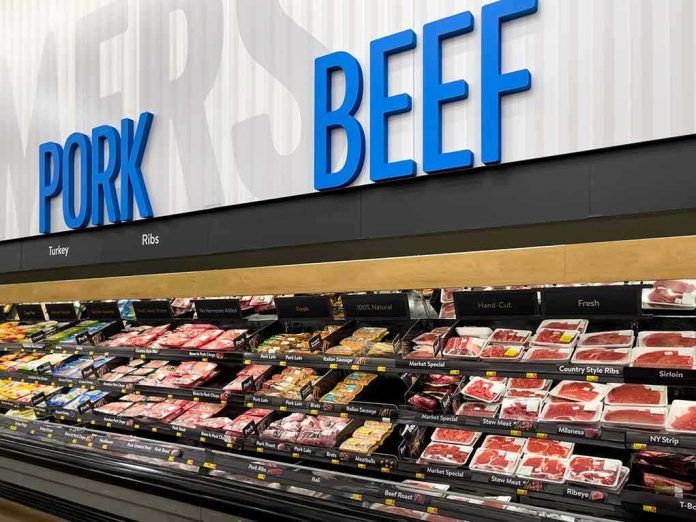
When you can’t even trust your local grocery store to sell you ground beef without a side of “foreign material,” you’ve got to wonder what exactly is going on behind those pristine supermarket aisles.
At a Glance
- Publix issued two ground beef recalls in Georgia in late June 2025 due to possible foreign material contamination.
- These recalls are just the latest in a string of food safety scandals dogging Publix throughout 2025.
- No illnesses have been reported, but the pattern raises serious questions about food safety oversight and consumer trust.
- Regulators, consumers, and industry experts all want answers on how such contamination keeps slipping through the cracks.
Publix’s Ground Beef Recall: The Latest Chapter in a Troubling Pattern
Publix Super Markets, once the gold standard for Southern grocery shopping, now finds itself under a harsh spotlight after recalling Market Ground Beef from two Georgia stores in June 2025. Both recalls, announced on June 25 and June 26, targeted stores in Sandy Springs and Gainesville, suburbs where families assumed they could buy dinner without worrying about mystery objects lurking in their meat. The reason? Potential contamination with—wait for it—“foreign material.” That’s bureaucratic double-speak for “we don’t know what got into your food, but it sure wasn’t supposed to be there.”
Customers were told to return or discard the products, with Publix offering the usual apologies and refunds. Company spokesperson Maria Brous did her best to assure the public that food safety remains Publix’s “top priority.” That sounds reassuring until you look at the bigger picture: these ground beef recalls are just the tip of the iceberg. Over the past year, Publix has yanked canned tuna, oysters, even their own GreenWise baby food off shelves over contamination fears. Maybe Publix should start handing out recall punch cards—buy ten, get one free?
A Year of Recalls and Eroding Trust
The June ground beef fiasco comes on the heels of a nearly nonstop parade of recalls in 2025. In January, stores in Florida pulled ground beef and pork over similar contamination concerns. February brought a sweeping recall of canned tuna across the Southeast, followed by Louisiana oysters linked to norovirus outbreaks. By May, it was GreenWise baby food, recalled for—you guessed it—elevated lead levels. At this rate, it’d be less risky to forage in your backyard than shop for dinner at Publix.
Publix’s decision to “act swiftly” and remove the products is the bare minimum, not a badge of honor. Consumers are expected to trust a chain that keeps playing Russian roulette with their groceries? Regulatory agencies have taken notice, and consumer advocacy groups are demanding answers. Food safety experts warn that “foreign material” isn’t just gross—it can cause real physical harm, especially to children, the elderly, and anyone with a compromised immune system. The more these recalls pile up, the more it feels like Publix is churning out press releases instead of actually fixing the root problem.
Who’s Accountable? Consumers Left Holding the Bag
Let’s be clear: the real losers here are the everyday customers. They’re the ones who have to double-check every package, worry about what’s really inside, and waste time driving back to the store for refunds. Meanwhile, Publix’s suppliers and food processors keep cashing their checks, apparently unable to keep mystery objects out of the production line. Regulatory agencies—supposedly the nation’s food safety watchdogs—are left scrambling to keep up with each new recall.
Repeated contamination incidents signal a deeper problem in the supply chain, possibly at the point where beef is processed and packaged. But don’t expect anyone at the top to lose sleep over it. It’s the customers, not the executives, who pay the price. Publix claims to be “committed to food safety,” but how many more apologies and recalls will it take before they actually earn back consumer trust?
The Broader Implications: Food Safety in an Age of Bureaucratic Excuses
The Publix recalls highlight a much bigger issue in America’s food industry: our growing dependence on mass-produced, centrally distributed food and a regulatory system that reacts only after the damage is done. When a major grocery chain repeatedly fails to keep basic staples safe, it’s a wake-up call about how much faith we put in faceless corporations and government agencies.
Industry analysts say repeated recalls at a chain like Publix should be a red flag for systemic problems—sloppy supplier audits, lax quality controls, or just plain old cost-cutting gone wild. If this is what passes for “safe” in 2025, maybe it’s time to rethink what we’re willing to accept from the people who feed our families. Until Publix and its competitors get serious about food safety, American shoppers will have to stay vigilant—and skeptical—every time they walk down the meat aisle.







